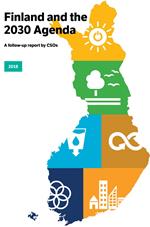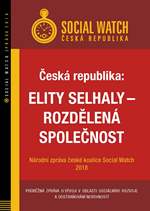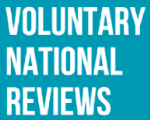Published on Thu, 2018-07-19 15:06
A group of CSOs share their long-term experience and knowledge of enhancing sustainable development. Each of the seven CSOs is responsible for its own area of expertise of the Finland and the 2030 Agenda follow up report. The Finland and the 2030 Agenda follow up report provides information about the state of sustainable development in the country, describes visions about the the future and above all makes specific recommendations for decision-makers to carry out the objectives discussed in the report. |
Česká republika: Elity selhaly – rozdělená společnost Národní zpráva české koalice Social Watch 2018 |
Published on Mon, 2018-07-16 00:00
The experience of Voluntary National Reviews and of Civil Society shadow (or spotlight) reporting. The side event "SDG Implementation at National Level: What’s the Point of National Reports?" was held on July 17 in New York, during the meeting of the High Level Political Forum of the UN. The debate focused on voluntary national reports (VNRs) and parallel “shadow” or “spotlight” reports generated by civil society organizations (CSOs) on progress towards the Sustainable Development Goals (SDGs). |
Published on Fri, 2018-07-13 06:51
The annual UN High-Level Political Forum (HLPF) has a unique role to review progress, define policies and flag priorities at national, regional and global levels for implementing the 2030 Agenda for Sustainable Development and achieving the SDGs. This agenda has also become the premier driver and justification for institutional, financial and data reforms and capacity development. A number of decisions have been adopted during the twelve months since the last HLPF that are central to the implementation of the 2030 Agenda and the SDGs, particularly the measurement of progress towards the SDGs and strategies to finance them. They are complemented by or responsive to proposals of the UN Secretary-General on the funding and institutional architecture of the UN system. |
Published on Fri, 2018-07-13 00:00
The experience of Voluntary National Reviews and of Civil Society shadow (or spotlight) reporting. How it is key for meaningful participation and accountability The national voluntary reporting to the High Level Political Forum of ECOSOC is a practice that has gained traction, as dozens of governments are volunteering each year to participate and contribute their VNRs. A number of CSOs have prepared their own shadow or spotlight reports to follow-up on their governments efforts to implement the 2030-Agenda. Rising inequalities and the need to substantially change policies to achieve the SDGs is a common theme in many of them. Is there a meaningful dialogue between the official and the alternative reports? What is the value of the whole exercise. |
SUSCRIBE TO OUR NEWSLETTER







